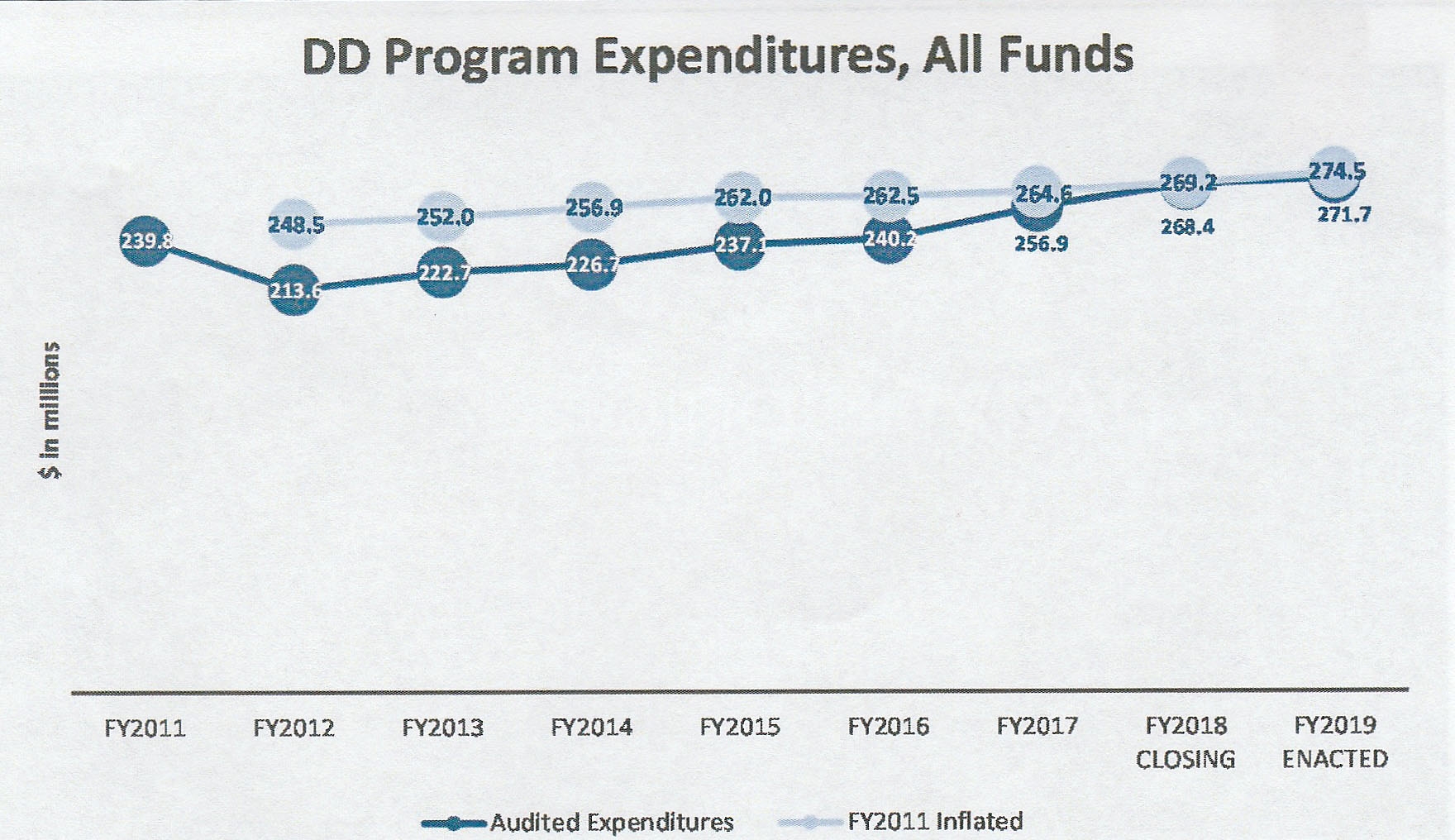By Gina Macris
A call for higher pay for direct service workers who assist persons with developmental disabilities ran like a thread through a General Assembly candidates’ forum in Newport Oct. 3, with several speakers saying better wages will help stabilize the system and improve quality.
Legislators urged an audience of about 25 to make their names and faces known at the State House to press this and other concerns when the General Assembly convenes again in January.
State Sen. Louis DiPalma, D-Newport, Middletown, Little Compton and Tiverton, said that Rhode Island cannot transform services for adults with developmental disabilities on a budget that has the same buying power as it did in 2011.
In Fiscal Year 2011, Rhode Island spent about $242 million on developmental disabilities, DiPalma said. Adjusted for inflation, using the consumer price index, that’s equivalent to the $272 million currently budgeted for the state Division of Developmental Disabilities.
DiPalma offered a glimpse of the work ahead for a Senate-sponsored commission that will convene Tuesday, Oct. 9 to begin discussing the current fee-for-service reimbursement system for private providers of supports to adults facing intellectual and developmental challenges.
The reimbursement system, called “Project Sustainability,” was inaugurated in Fiscal Year 2012, along with cuts that slashed spending on developmental disabilities from $242.6 million to $216.5 million, according to state figures.
Since 2014, the state has been under pressure from the U.S. Department of Justice to end an overreliance on sheltered workshops and other segregated care for adults with developmental disabilities, and instead emphasize competitive employment and integrated non-work activities to comply with the Americans With Disabilities Act.
At the Oct. 3 forum, DiPalma said the current practice of awarding individual funding authorizations according to the “level” of a person’s lack of independence is “just wrong” when successful appeals of individual awards have resulted in supplemental expenditures of up to $25 million a year for legitimate additional services on a case-by-case basis.
DiPalma, the chairman of the commission, said the panel will review every aspect of “Project Sustainability - what it is, how did we get there, and where do we want to go? What are the gaps?” The commission will meet at 3:30 p.m. Oct. 9 in Room 313 of the State House.
Rep. Deborah Ruggiero, D-Jamestown and Middletown, who has six years’ experience on the House Finance Committee, said people with disabilities want the exact same thing that people without disabilities seek – meaningful lives.
“But I’m not sure it’s a one-size-fits-all model, “ she said. “The whole system needs a good 20,000-foot overview.”
“It’s not right that people can make more money at McDonald’s than they can supervising people with intellectual and developmental disabilities, “ Ruggiero said.
One consequence of “Project Sustainability” has been double-digit cuts in wages, which also have derailed benefits such as health insurance, and opportunities for career advancement offered workers by private service-provider agencies. The wage cuts destabilized an entire workforce, which now averages a turnover rate of at least 33 percent a year.
Rep. Dennis Canario, D-Portsmouth, Tiverton and Little Compton, himself the father of someone with developmental disabilities, said that people generally “don’t understand the detrimental effect” of staff turnover on the individuals they assist.
Workers must have “expertise” to keep their clients on an even keel, particularly in some cases where clients are “very involved,” He said that It takes “expertise to turn situations around” or to keep individuals focused on the job at hand.
“When they get up in the morning, they need something to look forward to,” he said of people with disabilities. “We need to provide that type of day to our friends with intellectual and developmental disabilities. Together we can come up with the answers and solutions.”
“Pay inequity is a serious problem,” Canario said. “You’re not going to attract someone highly qualified” for $11 an hour,” he said. (The average pay for direct support workers is slightly less than $11.50 an hour.)
Connecticut and Massachusetts “are way ahead of us,” he said.
DiPalma noted that Massachusetts has already negotiated a minimum $15 hourly wage for direct care workers who are members of the Service Employees International Union. Many of the workers in nearby Massachusetts towns have trained in Rhode Island and still live in Rhode Island, he said.
DiPalma has sponsored a campaign to get a $15 hourly wage in five years, but it stalled in the last session of the General Assembly, when the developmental disability system was threatened with an $18 million cut in services. In the end, the legislature restored the status quo, but no gains were made.
Nevertheless, advocates deserve a “great round of applause for restoring that funding,” said Sen. Dawn Euer, D-Jamestown and Newport. She and others, including Rep. Kenneth Mendonca, R-Portsmouth and Middletown, urged them to keep it up.
Sen. James Seveney, D-Portsmouth, Bristol and Tiverton, signaled that he and his colleagues will again be pushing for a wage increase for direct care workers in the 2019 General Assembly session.
With the 2014 federal consent decree driving more integrated employment and community –based activities, the state must invest in additional transportation to make those opportunities a reality, said Euer. Others echoed her concern about transportation.
Terri Cortvriend, the Democratic candidate for Mendonca’s seat in the House, said she wanted to learn more about developmental disability services, particularly whether individuals and families are satisfied with the greater emphasis on competitive employment. Cortvriend currently chairs the Portsmouth School Committee.
Susan Vandal, a member of the audience, said families who have a child with a developmental disability want a system that allows them a “single point of entry” that begins early intervention for infants and toddlers and takes them seamlessly through the school years into adult services.
Parents must now jump through too many hoops, particularly in the transition from school to adult services, she said. Transition from high school to the adult system is also one of the prime concerns of an independent court monitor overseeing implementation of the consent decree.
Addressing the audience, Canario said legislators “need your help so we can make recommendations on how to fix a broken system.”
“A lot of parents are in the dark and don’t know what to do,” he said. Sometimes they are misled, with plans for services that are on paper but don’t become reality.”
The forum held at the Newport campus of the Community College of Rhode Island, was sponsored by the Newport County Parents Advocacy Group and Rhode Island FORCE (Families Organized for Reform, Change, and Empowerment.) RI FORCE streamed the event live and has posted the recording on its Facebook page, here.















